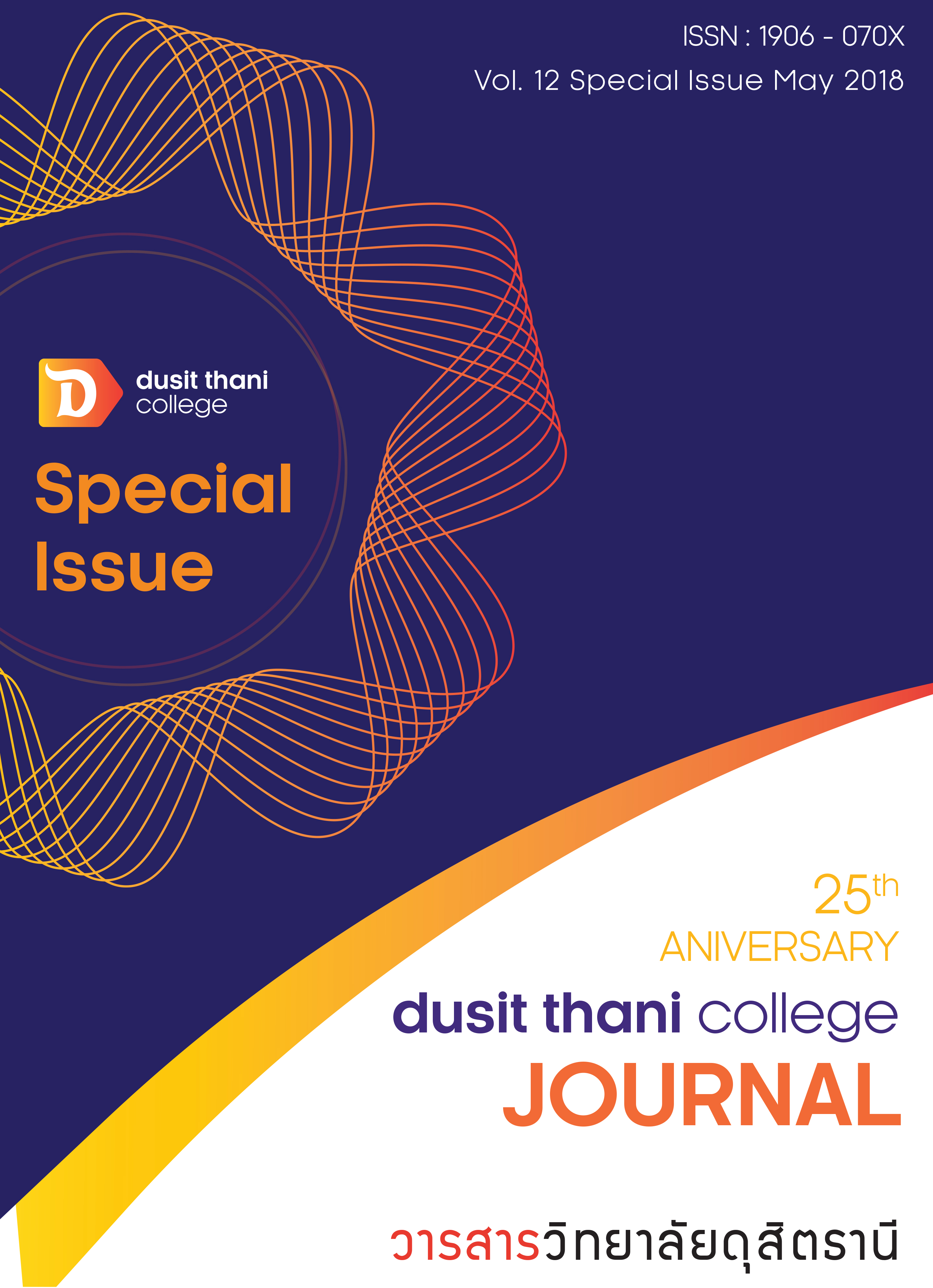Thai Gen Y People’ Travelling Behavior and Motivation Patterns
Main Article Content
Abstract
The purpose of this research is to study Thai Gen Y people’ travelling behavior and motivation patterns by using quantitative research. The populations of this study are Thai people between 22-36 years old who are living or working in various districts in Bangkok. Two data collection methods were used. The first one was the paper-based questionnaires that were sent to the samples by sampling some districts of Bangkok by method of Cluster sampling and the Quota sampling techniques was used to select some samples from each of those districts. The last one was the online questionnaires that were submitted via the Facebook and LINE application by method of Snowball sampling technique. The number of complete responses from the sample group was 394. R program was used to analyze the data by using descriptive statistics, such as, the frequency, percentage, mean, and standard deviation. In addition, this study used Statistics, Factor Analysis and hypothesis testing with the Chi-squared test, T-test, F-test and multiple comparisons with LSD method.
The research found that most of Thai Gen Y people are managing their own travelling plans behaviors. They enjoy travelling both domestic and abroad 1-3 times a year with 1-3 family members-travel ling companions by taking 3 days 2 nights on the weekend per trip. Travelling expenses are about 1,000-3,000 baht per trip and they like to travel to their destination by private cars. The most popular tourist attractions are the attractive natures. They will reserve their accommodations by the websites, such as, Agoda, Expedia, and etc. However, if they don’t use their own private cars, they will directly book the airplane tickets with the travel agencies or the airlines. The most influential decision-making medium is social media. The activities that Thai Gen Y people like to do the most during their travelling are photography, sightseeing, and food tasting respectively. To test the hypothesis that tourists with different demographic characteristics will effect different tourist behaviors, it found that the different incomes will result to different behaviors of tourists. This factor has more influence on tourist behaviors than other demographic characteristics.
The highest level of driving force that motivates Thai Gen Y people to travel is their physical and mental needs, especially the desire to relax while the demand for new social experiences is highly motivating. The motivation induced by the high level attraction factors are the interesting of destination attributes, tourism information dissemination of media and the effective transportation. Due to the hypothesis test that different demographic characteristics motivate different travelling behaviors, it found that different occupations did not result to different travelling motivations.
Article Details
Article Screening Policy
- All research and academic articles to be published must be considered and screened by three peer reviews in the relevant field / article.
- All articles, texts, illustrations and tables published in the journal are the personal opinions of the authors. Editors don't always have to agree. And no responsibility whatsoever is the sole responsibility of the author.
- The articles to be published must never be published. Where did you first publish? And not in the consideration of other journals If the audit found that there has been a duplicate publication It is the sole responsibility of the author.
- Any article that the reader sees as being plagiarized or impersonated without reference. Or mislead the work of the author Please let the journal editor know it will be your greatest blessing.
References
Influences and opportunities. Current Issues in Tourism. 17(10), 872-909.
Department of International Trade Promotion in Los Angeles. (2016). Consumption
Behavior and Marketing Channels for Each Generation. Retrieved January 16,
2017, from https://www.thaitradeusa.com/home/?p=21482
Hurun Report. (2016). Generation Y : Chinese Luxury Travelers Come of Age. The
Chinese Luxury Traveler 2016. Retrieved January 16, 2017, from
up.hurun.net/Hufiles/201605/20160530111720288.pdf
Katudat, Norapol. (2014). Travel motivations and market segmentation of European travelers visiting Bangkok. Master of Liberal Arts Thesis, Department of Tourism Management, Faculty of Tourism and Hotel, Dhurakij Pundit University.
Li, X., Xiang, L., & Simon, H. (2013). The application of generational theory to tourism
consumer behavior: An American perspective. Tourism Management, 147-164.
Millanials (2558) Wikipedia. Retrieved January 16, 2017, from
https://en.wikipedia.org/wiki/Millennials
Murthy, U., Paul, A.M., & Gopal, P. (2016). The Behaviors of Generation Y Tourists from
Asean Countries towards Malasian Tourism Industry in Kuala Lumpur, Malaysia.
International Journal of Business and Management, 249-260.
National Statistical Office and Tourism Authority of Thailand. (2016). Survey of travel
behavior of Thai people in 2016. Retrieved December 10, 2016, from
https://service.nso.go.th/nso/nsopublish/themes/files/TravelExc59.pdf
Pimolsompong, Chalongsri. (2008). Planning and developing the tourism market.
Bangkok: Publisher of Kasetsart University.
Piranha (2015). Asian Focus. Awesome by Nokscoot, 1(4), 32-37.
PriceWaterhouseCoopers (2556). NextGen: A global generational study 2013. Retrieved
November 15, 2015, from https://www.pwc.com/th/en/press-room/highlight.../20130606
Raunio, J.M. (2014). Understanding the Travel Behavior of Generation Y.
Master thesis in Human Geography, Department of Tourism Studies and Human Geography, Mid-Sweden University.
Registration system, Department of Provicial Administration. (2016). Population by age. Retrieved January 28, 2017, from https://stat.dopa.go.th/stat/statnew/upstat_age.php
Šimková, E., & Holzner R. (2014). Motivation of Tourism Participants. Procedia-Social
and Behavioral Sciences. 159, 660 - 664.
Techaprasert, Krit. (2013). Tourist behaviors of male homosexual (Gay) in Khon Kaen
province. Independent Study Report of Master of Business Administration, Department of Tourism Management, Faculty of Management Science, Khon Kaen
University.
Tourism Authority of Thailand. (2016). Keep Calm and Understand Gen Y. TAT Review, 32 - 37.


